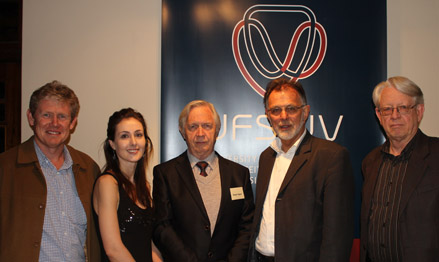Latest News Archive
Please select Category, Year, and then Month to display items
27 December 2019
|
Story Dr Cindé Greyling
|
Photo Supplied

KovsieInnovation at the UFS is bridging the gap between industry and academics with a powerful force. For too long, research remained an academic pursuit, with many innovative ideas stuck between the pages of a thesis – only to come alive during exclusive, short-lived conference proceeds.
KovsieInnovation
Recently, Gerard Verhoef, Director in the Directorate: Research Development (DRD), and his team from KovsieInnovation finalised their Innovation and Commercialisation Strategy in order to create a structured pathway for good ideas. The primary objective of KovsieInnovation – the UFS Innovation and Entrepreneurship Office – is to achieve sustainable growth in third-stream income from innovative research activities stemming from the UFS. “Potential successful ideas must be feasible, viable, and sustainable, and we formulated an eight-step plan to facilitate this,” Verhoef explains. Ultimately, the DRD wants to attract new and continuous research as a renowned academic knowledge partner that can foster, drive, and successfully commercialise innovative research activities; and in doing so, foster an entrepreneurial culture at the UFS.
Liquid Culture
One such success story is the development of Liquid Culture into a business of choice, supplying liquid yeast to breweries and bakeries. Christopher Rothmann and Dr Errol Cason are the driving forces behind this company that produces their sought-after and stable yeast product in the Department of Microbiology, Biochemistry and Food Biotechnology at the UFS. With world-class equipment and laboratories, they house one of the largest yeast-culture collections in the world.
Both Rothman and Dr Cason were home brewers for many years before starting to produce commercial batches. They believe it would not have been possible without the help of KovsieInnovation. This project was also one of the finalists in the National Entrepreneurship Intervarsity.
Christo Strydom Nutrition (CSN)
Another innovative way in which the UFS generates third-stream income via the DRD, is by partnering with already successful commercial products. One such example is the recent successful royalty agreement with CSN. With this transaction, the university unlocked its brand potential to the benefit of both the industry partner and the UFS. Quality assurance remains the key success factor for deals like this.
Supplementum analyses the San origin of South African place names
2013-09-25
|
 |
|
At the launch were, from the left: Prof Lucius Botes (Dean: Faculty of the Humanities), Christine van Deventer (SUN MeDIA), Prof Peter Raper (author), Prof Theodorus du Plessis (Head of Department: Linguistics and Language Practice), and Prof Dirk van den Berg (outgoing editor).
Photo: Jerry Mokoroane
25 September 2013 |
The Acta Academica Supplementum 2012 (2), under the outgoing editorship of Prof Dirk van den Berg, was launched on 16 September 2013. The author, Prof Peter Raper, is one of the leading place-name experts in South Africa. The Supplementum analyses the San origin of South African place names whereby different layers of language contact are exposed. For example, Dipodi (previously Jakkalsdraai), is an adaptation of the original San name. The first ‘di’ is the added Sotho preposition. ‘Po’ is equal to the San word ‘po’ (jackal) and the last ‘di’ equal to ‘/gi’ (to bend). Prof Raper’s research indicates that many place names carry evidence of various language shifts. By analysing these language layers, different phases of language contact are exposed. This research is instrumental in the preservation of a unique aspect of the South African cultural heritage.
Prof Raper is since 2011 Honorary Professor: Linguistics, in the Department of Language Management and Language Practice at the University of the Free State. He is one of South Africa’s leading toponymists. The fourth edition of the New Dictionary of Southern African Place Names, with Dr Lucie Möller and Prof Theodorus du Plessis as co-editors, is currently in the press. He is a member of the Commission for Toponymy of the International Geographical Union, as well as the Working Group for Toponymy of the International Cartographic Association, of which there are only ten members worldwide, and a member of the Editorial Advisory Board for the journal Names.